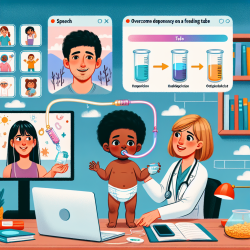Feeding tube dependency in children presents a complex challenge for practitioners, but recent research offers valuable insights into its development, prevention, and treatment. The study titled Development, prevention, and treatment of feeding tube dependency (Krom et al., 2017) provides a comprehensive overview that can help speech-language pathologists (SLPs) and other healthcare professionals enhance their approaches to managing this condition.
Understanding Feeding Tube Dependency
Feeding tube dependency occurs when children rely on tube feeding for nutrition despite being medically stable enough to eat orally. This dependency can lead to significant health, psychosocial, and economic consequences. According to Krom et al. (2017), tube dependency arises from a combination of factors, including decreased motivation to eat, negative oral experiences, and disrupted caregiver-child interactions.
Key Recommendations for Practitioners
The transition from tube to oral feeding can be challenging and requires a multidisciplinary approach. Here are some evidence-based strategies highlighted in the research:
- Early Intervention: Initiate tube weaning as soon as possible to prevent long-term dependency.
- Multidisciplinary Team: Involve a team of professionals, including pediatricians, dietitians, psychologists, SLPs, and occupational therapists, to address the various aspects of tube dependency.
- Behavioral Interventions: Implement behavioral strategies such as family therapy, individual behavior therapy, and parental anxiety reduction to increase oral intake and reduce fear of swallowing.
- Oral Motor Therapy: Use oral motor programs to improve swallowing and chewing coordination, and to treat maladaptive feeding behaviors.
- Hunger-Inducing Methods: Consider hunger-inducing methods like the Graz-model or the Dutch clinical hunger provocation program for effective tube weaning.
Encouraging Further Research
While the research provides a solid foundation, there is a need for further studies to explore long-term outcomes and the efficacy of different weaning programs. Practitioners are encouraged to stay updated with the latest research and consider participating in studies to contribute to the growing body of knowledge in this field.
To read the original research paper, please follow this link: Development, prevention, and treatment of feeding tube dependency.










